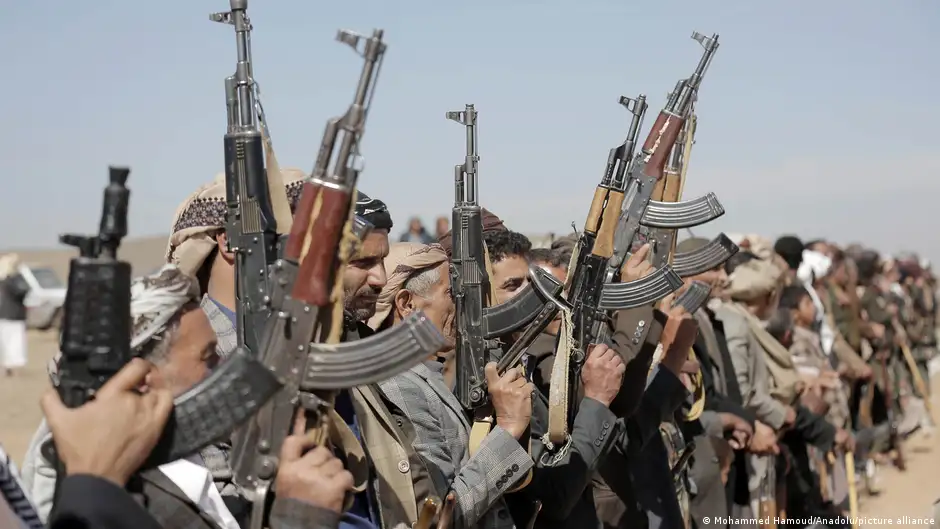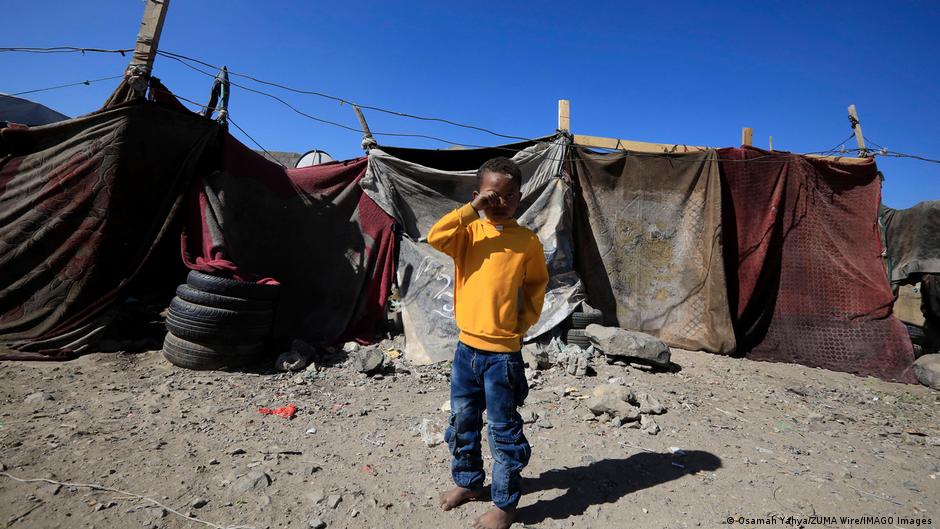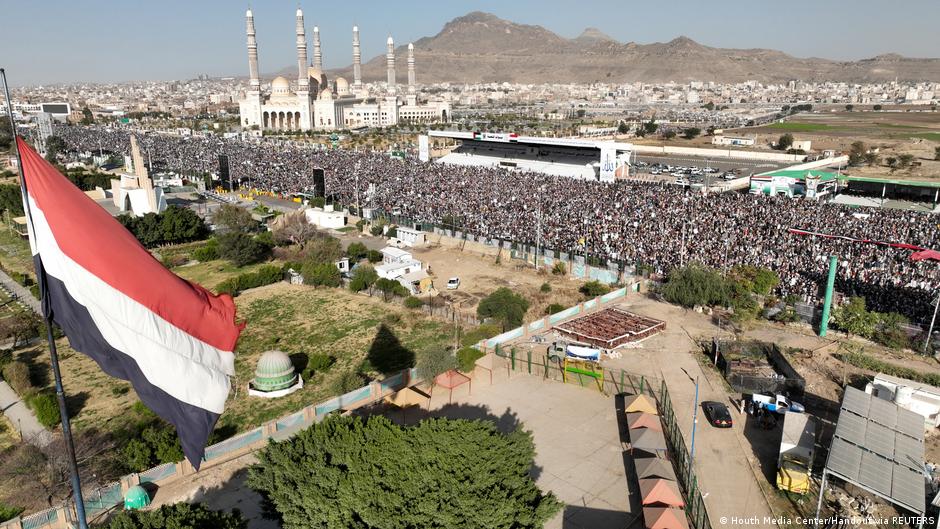Houthi 'terrorist' label a threat to Yemen aid?

In Yemen, opinions are divided: at the end of this week, the Houthi rebel group, which controls much of the country after a nine-year civil war, will be designated a terrorist organisation by the U.S. government.
The designation comes in response to Houthi attacks on maritime traffic passing Yemen's coastline. The Houthis themselves say they started attacking passing cargo ships to protest Israel's bombardment and blockade of Gaza and that they won't stop until there is a ceasefire. The U.S. says the Houthi attacks "fit the textbook definition of terrorism".
This most recent development leaves locals in Yemen conflicted. Polls regularly show that almost all Yemenis staunchly support the Palestinian cause, including one conducted in late December 2023. But not everyone agrees with the Houthis.
"I believe they [the Houthis] are doing this out of their moral, religious and brotherly duty, to support the citizens besieged in the Gaza Strip," said Nasser al-Hamdani, a 40-year-old agricultural engineer. He says he wouldn't be directly impacted if aid shipments stopped coming but some of his relatives, who regularly receive food baskets, would be.
That's what makes him even more supportive, however. "Despite Yemen's need for aid shipments, it stands in solidarity with others who are in need of aid," he argued.
Elham, a 33-year-old aid worker, who didn't want to give his full name because of his job, was more ambivalent. "We don't have to agree with all the actions of the Houthis," he admitted. "Personally, I see that they harm Yemen more than they serve Palestine. On the other hand, I don't think there are any Yemenis who do not stand with Palestine."
This is not the first time the Houthi rebel group has been designated a terrorist organisation by the U.S. government. The Houthis were previously labelled a "foreign terrorist organisation", or FTO, in January 2021, at the end of Donald Trump's presidency. Aid organisations were extremely worried at the time, saying it would compromise their ability to help ordinary Yemenis.
Since late 2014, when the civil war in Yemen began, the country, already one of the poorest in the region, has fallen into increasingly desperate straits. In 2023, around 21.6 million of Yemen's approximately 32.6 million people required humanitarian assistance.
This was part of the reason why, in February 2021, shortly after current U.S. President Joe Biden took power, the Trump decision was reversed. But this January, after Houthi attacks on international shipping vessels in the Red Sea, the U.S. government has decided to once again classify the Houthis as a terrorist group.
Different varieties of terrorist
This time, however, instead of labelling the Houthis an FTO, the Biden administration is using the term "Specially Designated Global Terrorist", or SDGT. They also gave the group a 30-day warning; saying the SDGT designation would not come into effect until 16 February.
There are significant differences between an FTO and SDGT. "Being designated an FTO makes it illegal for anyone to give the group 'material support', including fighting for the group, giving it money, in-kind support or training," Nathan Sales, a former U.S. State Department coordinator for counterterrorism, wrote in an Atlantic Council briefing last month. That means anybody dealing with the group could also be considered a terrorist, he noted – including aid organisations and banks.
The SDGT designation also targets an individual’s or organisation’s funds by cutting off access to financial or material support from the United States. However, from a legal perspective, the SDGT designation is slightly less restrictive, and still permits affiliates to legally enter the designating country – in this case, the U.S. – for example. The label also bars extraterritorial application, meaning individuals or entities cannot be subjected to U.S. sanctions or prosecutions if the conduct was not committed by a U.S. citizen or on U.S. territory.
In a special briefing on 16 January, two U.S. State Department officials explained the reasoning behind the SDGT decision. "We recognise the grave humanitarian situation in Yemen and we are taking many steps to ensure these sanctions do the least harm to the Yemeni people," the officials said. Special licenses for "food and medicine and medical devices, fuel, personal remittances" will be issued, the officials noted, as well as special allowances for aid organisations.

Still, aid organisations remain "deeply concerned," said Renata Rendon, advocacy manager for the Norwegian Refugee Council in Yemen. "We welcome the introduction of humanitarian exemptions but our experience shows that designations like this – especially where the designated entity serves as the de facto authority in the country – can often cause a chilling effect even when safeguards are in place."
A "chilling effect" includes donors being put off by sanctions, staff at aid organisations spending more time navigating sanctions than doing humanitarian work and private sector actors deciding it's not worth investing in Yemen, Rendon explained.
Long-term impact of terror designation
Despite the SDGT designation being slightly softer, Hisham al-Omeisy, a Washington-based senior advisor on Yemen for the European Institute of Peace, worries it could still harm the country's longer-term economic future.
"The Houthis are in control of state institutions and have created massive financial networks in their areas," he explained. "So a designation would inevitably impact economic development in areas under their control unless the sanctions come with clear and significant carve-outs."
It's not just the possible sanctions causing economic problems either. While most Yemeni ports remain open, aid workers on the ground say prices to ship into Yemen have now tripled due to the Houthis' maritime campaign.
Additionally, the rise in global shipping costs because of the campaign will translate into higher prices everywhere, the United Nations Security Council warned in its February forecast. That's something else that will impact Yemen's imports, it noted.

Peace talks derailed?
Questions have also been raised about whether the SDGT designation might upset the UN-led peace process that had been looking increasingly likely to end Yemen's stalemated civil war. In late December, all parties committed to a new ceasefire.
But the Houthis' campaign in the Red Sea has made them more popular with locals, observers say, and they've attracted more recruits as a result. That makes them a stronger force and potentially more interested in continuing to fight, some experts have suggested.
"The SDGT designation may also complicate political talks and negotiations by virtue of the red lines and restrictions it creates for parties dealing with the Houthis," al-Omeisy concluded. "It may not completely de-rail current talks or the UN-led peace process, but it also raises a lot of legal and moral questions in terms of dealing with a formally designated global terrorist."
On the other hand, al-Omeisy conceded, the new SGDT designation is just "one small wrench thrown into a big machine with many cogs. All of those need to work in order to secure a lasting peace in Yemen."
© Deutsche Welle 2024
